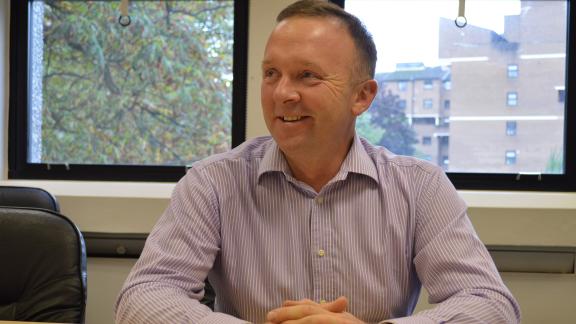The need for sustainable social care funding

The health and social care system has faced a tremendous amount of pressure, which we’ve seen escalating further in recent months. Most of this pressure is not borne of new problems but has been exacerbated by the pandemic.
The pressure on the system is multi-faceted, with complex factors contributing to a perfect storm of unbalanced ‘demand and supply’. Central to this is patient flow through the health and care system. The NHS has always been reliant on a sustainable social care system and increasing issues of capacity and workforce in social care are having serious implications on the NHS’ ability to discharge large numbers of medically fit patients from hospital into care packages. There are currently well over 1,000 patients in Welsh hospitals who are medically fit and ready for discharge - this is more than the number of beds in the University Hospital of Wales, the largest hospital in Wales.
Currently, around 15 per cent of hospital bed capacity is taken up by those unable to be discharged.
We know that when patients stay in hospital longer than needed their condition will often deteriorate, they may lose some of their independence, or at best their recovery is hindered. But with a shortage of care packages – whether places in care homes or availability of domiciliary care – the only short-term option for the patient is often to remain in hospital.
So, what are the consequences? Apart from the negative impact on the patient and their recovery, this slows the flow of patients through hospitals, affecting care available for others who need it. At the time of writing, bed occupancy rates in the NHS in Wales are at their highest since the pandemic began, with some areas experiencing over 90 per cent occupancy.
Currently, around 15 per cent of bed capacity in hospitals is taken up by those unable to be discharged. Therefore, at a time when demand for NHS services is the highest on record, this takes away precious capacity to treat more patients in other parts of the system. One of the most visible knock-on effects is the ambulance service’s ability to provide effective and rapid responses in emergencies. If there are fewer beds available, there’s less capacity to treat A&E patients and those arriving by ambulance, who are then unable to get back out on the road to help more patients, causing waits to escalate further.
But patient flow through the health and care system is not the only factor contributing to the NHS’ limited capacity. Undoubtedly, the principal challenge is the shortfall in staff. Many staff working in health and care are exhausted, with wider workforce challenges compounding the situation. Higher absence rates due to stress, psychological issues, needing to self-isolate or due to long COVID, are intensifying pre-existing staffing issues in the system.
In social care, there are many factors contributing to soaring levels of staff vacancies, namely the inability to compete with rising wages in other sectors, such as retail and hospitality. The consequences of Brexit and the new immigration system have also negatively impacted the employment of non-British nationals working in social care. Providers are being squeezed further and therefore cannot raise wages to compete. Low wages have a huge impact on staff retention, so the issues continue to worsen.
There must be better training and development opportunities, with improved career pathways and parity of esteem with NHS staff. If we enhance terms and conditions, provision of wellbeing resources and make roles more fulfilling, then both recruitment and retention should improve.
But the attractiveness of working in social care goes beyond pay. Temporary boosts to wages and other initiatives to try and recruit, like free accommodation and sign-on bonuses, have not necessarily been successful in filling vacancies. There must be better training and development opportunities, with improved career pathways and parity of esteem with NHS staff. If we enhance terms and conditions, provision of wellbeing resources and make roles more fulfilling, then both recruitment and retention should improve.
Essentially, social care must be seen as a positive and viable career option, one that doesn’t cause prospective employees to worry about being undervalued and overworked. Social care is still described as ‘low-skilled work’ by the UK Government - as a society we must acknowledge and respect the value that those working in social care (and unpaid carers) bring to the health and wellbeing of our communities.
The challenges facing social care go beyond staff vacancies; these include vulnerabilities in funding and market stability, increased demand and growing unmet need. Their impact on capacity means people are missing out on vital care and support they need to live well and help prevent them becoming ill.
Improving the situation in the NHS requires all parts of health and social care to work together.
These extreme pressures are subsequently impacting the ability of both the NHS and social care to continue delivering services, meaning it’s often impossible to meet demand for care. This system-wide challenge to provide care is starting to affect the health of our communities, with higher numbers of very sick people presenting in A&E and compromised quality of life for the thousands awaiting treatment.
Improving the situation in the NHS requires all parts of health and social care to work together. Hospitals are working hard to improve efficiency in A&E departments, and health and local authority partners are taking clear actions to address the undeniable pressure in social care, with initiatives in hospital discharge, workforce and supporting people to stay well in the community. There is a renewed focus on broadening approaches to the provision of care and support, including working with the voluntary sector and families themselves, and work is being done to reduce avoidable hospital admissions, especially for frail and older people.
However, the long-standing issues within social care adds urgency to existing calls for governments across the UK to support integration between health and care and create a sustainable financial model for the sector, to ensure social care has the required long-term investment to attract, recruit, train and retain a sustainable domestic workforce.
In the short-term, the Welsh Government need to urgently provide extra recurrent funding and support to social care services to ensure that medically fit patients can be safely discharged into the community. This will help free up capacity in the NHS, reduce ambulance handover and other delays in A&E, and reduce pressure on community and primary care services. The Welsh Government needs to mobilise all the resources it can to help the NHS through what we expect will be the most challenging winter on record.



